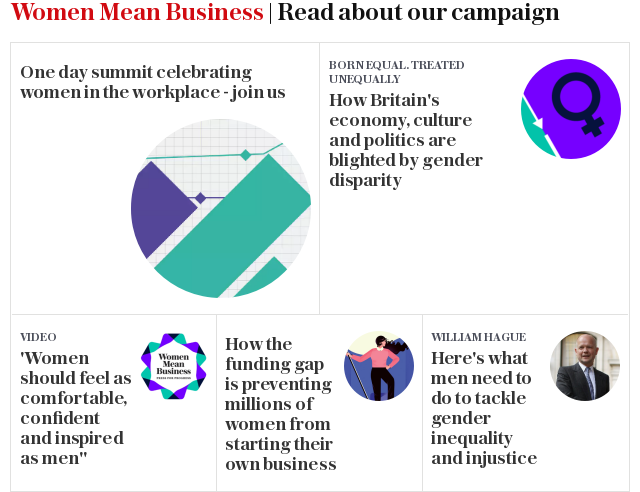It's time for men to 'women-up' in the workplace


It's well known that there are too many pairs of brogues strutting across the top of the glass ceiling. Men have long dominated the boardroom, and advertising, the industry I work in, is as blighted as any other (indeed, there's an argument that we shoulder more blame, having reinforced gender stereotypes through innumerous ads – but I'll leave that one for another day).
Of course, there's an increasingly strong movement to redress this balance, as embodied by The Telegraph's Women Mean Business campaign, which has launched today. To me, one of the interesting things about the movement is that it taps into a hunch that I've harboured for a while, and that research is starting to substantiate: women are simply more effective than men in business.
It all goes back to how we react to stress. For years – and you'll probably remember this from biology at school – science believed that when threatened, humans underwent a 'Fight or Flight' process: we either came out swinging, or legged it. However, around the turn of the 21st century, scientists realised that a lot of the clinical work supporting ‘Fight/Flight’ had been performed on men. Gender simply hadn't been considered when it came to scrutinising the data. We had based our insights around only one half of the species.
Men certainly do appear to have a strong Fight/Flight instinct. In 2012, Dr Joohyung Lee and Professor Vincent Harley identified a particular gene (SRY, or 'The Macho Gene' as news stories dubbed it at the time) that triggers the development of the testes, secretes hormones to masculinise the body, and appears to nudge our adrenal gland into overdrive when under stress. The fact that women do not have SRY points towards a concurrent conclusion from the world of science: that women's Fight/Flight instinct is calmed by Tend/Befriend, a process first identified in work by researchers at the University of California.
Evolution is at hand here to explain why. Fight/Flight fails as a survival strategy for women because historically they have taken primary roles in ensuring the little’uns become the big’uns. The same Darwinian forces that push men into Fight/Flight works the other way in females: high maternal investment favours responses that don’t jeopardise the survival of their children. Sociologically speaking, 'befriending’ activity involves affiliation and collaboration within a group, creating networks to provide mutually assured support during stressful times. Tend/Befriend means reaching out, building trust, defusing conflict, putting the kettle on and breaking out the Rich Teas.
What does this mean within business? If I look without any prejudicial squint, I see clear indicators of Tend/Befriend in the businesswomen who help me run my organisation.

Recent research supports the idea that such an approach is simply more effective. A 2015 survey of 2,000 people by the University of Cambridge found that female CEOs generated more profits than their male counterparts. They were more likely to maintain business outlooks favouring controlled growth, reinvesting profits over taking equity out. They were more averse to risks that may mess up their employees’ livelihoods. Men, on the other hand, were more likely to take equity out at the earliest opportunity, taking more risks to do so.
In a related sphere of influence, I recently detected evidence of Tend/Befriend in a UN report about the type of policies that get enacted by male and female politicians. To give one example, the number of clean drinking water projects in India in areas with women-led councils was found to be a massive 62pc higher than those with men running the show. Plainly the guys think their constituents need to man up. Who needs water, right?
Does this stray too close to the cliché of female leaders as ‘nurturing’ types? Well, a study by US leadership consultancy Zenger Folkman of 16,000 leaders (two thirds male, one third female) suggested women outperformed men in taking initiative, getting things done, and driving for hard results; and pointed out that these were ‘not nurturing competencies’, inferring that they are commonly assumed qualities of male leaders.
Is it possible that these so-called ‘male’ business qualities are smoothed by the fine-grained sandpaper of Tend/Befriend? That women possess a wider spectrum of competencies, and therefore make more rounded leaders? If so, we men clearly need to explore whether or not we can ignore the klaxon call of our testicles and… woman up.
By making the playing fields level between men and women, we will not only improve the way we do business, but everything we do in life
Michael Brown
My personal role models in this endeavour include two female business partners on my management board. Both can engage their inner Boadicea in the hand-to-hand combat sometimes required in business, and in the next breath are elbow-deep creating an induction programme that ensures our newbies have a motivating experience in their first weeks.Their approach contrasts favourably to my past motivations, which have all been about competing for and closing of deals – actions borne of fight mode.
Since becoming aware of how male responses can colour business making decisions, I have actively tried to channel Tend/Befriend. It’s proved effective in the staple activity of ad agencies, the group brainstorm. I have noticed men seem to speak more in those meetings, not necessarily in a good way: often speaking over women and diverting the course of that person’s creative flow, refocusing the room to the interrupter’s idea. Many brilliant trains of thought are ruined in this way. We have put in place protocols to guard against ‘diverters’, including a 50/50 gender split, and someone is assigned to call out such behaviour if it occurs.
Can I continue to counter my male Fight/Flight instincts? Interestingly, the Zenger Folkman study ranked gender against 16 competencies deemed essential to success, including communicating prolifically, developing others and being collaborative (women came out top in 12). To describe these qualities as competencies is salient, because a competency is learned. I may be hardwired to fight or flight, but I can cling to the idea that, with practice, I could become a tenderer befriender.
Whether I achieve such a goal or not, it’s clear that inequality is holding business back. We really don’t need to be sat in opposing camps factionalised by gender (especially when gender is a spectrum). By making the playing fields level between men and women, we will not only improve the way we do business, but everything we do in life.
To reach that particular promised land, we need all the talent out there, working in harmony from a position of jointly held power.
Michael Brown is the London Managing Director of MKTG. The above article is an edited extract from his forthcoming book, I Don’t Agree – The Reasons For Conflict And How To Resolve I


